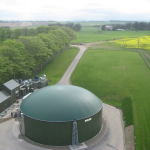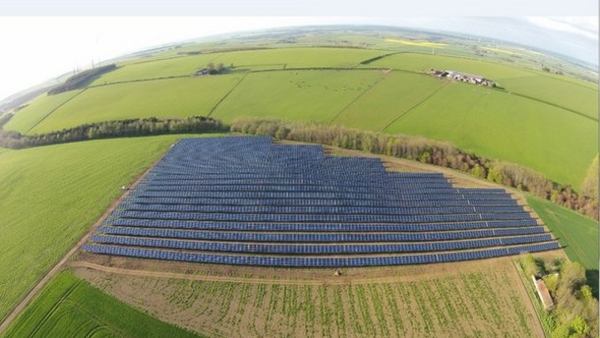Jorge Daniel Sánchez Thierry Mexico

This programme has been specifically designed to help meet the projected growth in demand for renewable energy specialists by teaching the advanced skills needed to design, build and optimise renewable energy infrastructure.
This programme has January and September start dates. Apply Now.
Eligible self-funded international Masters students will receive the Aberdeen Global Scholarship. Visit our Funding Database to find out more and see our full range of scholarships.
MSc Renewable Energy Engineering is also available to study part time online.
According to a recent report, 40% of the UK’s power in 2022 came from a mix of wind, solar, bioenergy and hydroelectric sources. The massive worldwide growth in renewables is creating a major skills shortage as countries rush to develop more secure and sustainable energy sources.
One of the main features of this programme is its breadth and interdisciplinary approach to renewable energy. The courses draw heavily upon the research expertise of the School of Engineering and our industry partners to provide you with a thorough grounding in the technical and scientific aspects of renewable energy, including, marine, wind, solar, geothermal and bioenergy.
You will also gain an in-depth understanding of the challenges related to energy conversion, storage and integration to the grid and engage with the wider legal and commercial considerations involved in renewable energy.
Aberdeen is an exciting place to study renewable energy engineering as the city and surrounding region are at the forefront of the energy transition in the UK. There are several major energy transition projects already up and running including Equinor’s Hywind project and the European Offshore Wind Deployment Centre, Scotland’s largest offshore wind test and demonstration facility.
The city’s new Energy Transition Zone – part of the £350 million Aberdeen Harbour expansion – will act as a focal point for applying the tremendous R&D expertise built up in oil and gas over the last four decades to fast-track the development and deployment of wind, tidal, hydrogen, geothermal, and carbon capture storage technologies.
With hundreds of energy companies based in Aberdeen, our programmes benefit from significant industry engagement, including industry advisory panels, guest lectures, field trips, site visits, networking and careers events, and industry-supported student projects.
We will endeavour to make all course options available; however, these may be subject to timetabling and other constraints. Please see our InfoHub pages for further information.
Further Information about tuition fees and the cost of living in Aberdeen
Self-funded international students enrolling on postgraduate taught (PGT) programmes will receive one of our Aberdeen Global Scholarships, ranging from £3000 to £8,500, depending on your domicile country. Learn more about the Aberdeen Global Scholarships here.
To see our full range of scholarships, visit our Funding Database.
By written examination and coursework as prescribed for each course. In addition, MSc candidates must submit a dissertation on their individual project.
The information below is provided as a guide only and does not guarantee entry to the University of Aberdeen.
2:1 (upper second class) UK Honours degree, or an Honours degree from a non-UK institution which is judged by the University to be of equivalent worth in any branch of Engineering, Physics, Maths or Chemistry.
Students with a 2:2 AND 2+ years of relevant experience may also be considered
Key subjects you must have covered: Mathematics.
Academic Technology Approval Scheme (ATAS) certificate
The CAH3 code for this degree is CAH10-01-09. Students who need a visa to live or study in the UK must apply for ATAS clearance. The ATAS clearance certificate must be valid when you apply for a visa to enter the UK. To find out if you need to apply for ATAS clearance, please visit https://www.gov.uk/guidance/academic-technology-approval-scheme
Please enter your country to view country-specific entry requirements.
To study for a Postgraduate Taught degree at the University of Aberdeen it is essential that you can speak, understand, read, and write English fluently. The minimum requirements for this degree are as follows:
IELTS Academic:
OVERALL - 6.5 with: Listening - 5.5; Reading - 5.5; Speaking - 5.5; Writing - 6.0
TOEFL iBT:
OVERALL - 90 with: Listening - 17; Reading - 18; Speaking - 20; Writing - 21
PTE Academic:
OVERALL - 62 with: Listening - 59; Reading - 59; Speaking - 59; Writing - 59
Cambridge English B2 First, C1 Advanced, C2 Proficiency:
OVERALL - 176 with: Listening - 162; Reading - 162; Speaking - 162; Writing - 169
Read more about specific English Language requirements here.
You will be required to supply the following documentation with your application as proof you meet the entry requirements of this degree programme. If you have not yet completed your current programme of study, then you can still apply and you can provide your Degree Certificate at a later date.
Eligible self-funded post graduate taught (PGT) students will receive the Aberdeen Global Scholarship. Explore our Global Scholarships, including eligibility details, on our dedicated page.
Aberdeen Global ScholarshipsEach year, there is an increase in the number of renewable energy projects being developed around the world. This steady increase in activity will continue to create jobs and it will also emphasise the need for skilled leaders, with strong engineering backgrounds.
By exposing you to the various renewable energy sources of power, and the technologies required to operate and develop them, you will graduate with extensive knowledge and skills. As well as strong technological skills, you will also develop an understanding of the commercial and project management skills required to run renewable energy projects, safely, on time and to budget.

The opportunity exists to visit Gask Farm in Aberdeenshire. They have an anaerobic digester at the farm which converts organic waste from various sources into methane, which is then converted to electricity and sold to the grid.Find out more
You will be taught by a range of experts including professors, lecturers, teaching fellows and postgraduate tutors. Staff changes will occur from time to time; please see our InfoHub pages for further information.

Annual field trips are arranged to visit a number of different renewable energy companies. One company that supports the degree is Mackies, the ice-cream and crisps manufacturer who currently have the largest solar panel setup in Scotland.